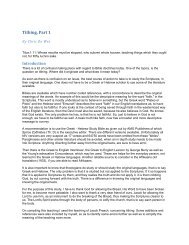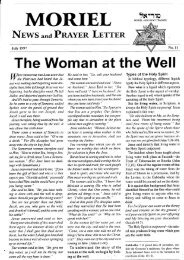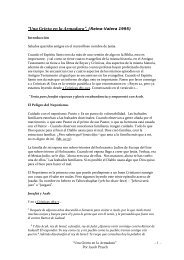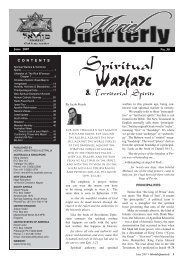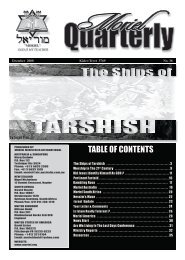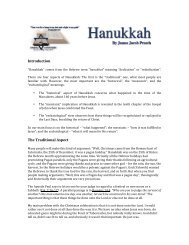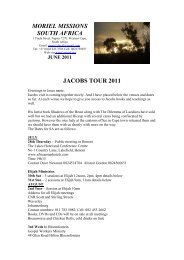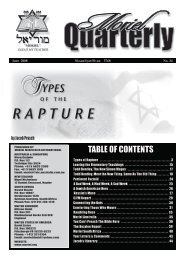Kashrut and Famine (~17.69 MB) - Moriel Ministries
Kashrut and Famine (~17.69 MB) - Moriel Ministries
Kashrut and Famine (~17.69 MB) - Moriel Ministries
Create successful ePaper yourself
Turn your PDF publications into a flip-book with our unique Google optimized e-Paper software.
Sons of Zadok – Continued<br />
Sons of Zadok – Continued<br />
Lord is blessing them, for look how they’ve<br />
grown. But that’s silly; it is sheer idiocy. We<br />
have men st<strong>and</strong>ing in pulpits today behaving<br />
like idiots. Not a nice word; but Paul<br />
uses the word idiotae in Corinthians.<br />
I think that people should leave bad<br />
churches in order to come to good ones; yet<br />
the Gospel should be our focus. One danger<br />
that can happen in good churches is this: because<br />
they st<strong>and</strong> up for truth against error,<br />
they wind up becoming hospitals for Christians<br />
who have been ripped off <strong>and</strong> abused<br />
in bad churches, <strong>and</strong> lose their own evangelistic<br />
focus. This shouldn’t be allowed<br />
to happen; a balance should be kept. It can<br />
easily happen that a good church becomes<br />
a hospital for abused Christians rather than<br />
focusing on evangelistic outreach to the<br />
community.<br />
What comes next? “It shall be that when<br />
they enter, they shall be clothed with linen<br />
garments; wool shall not be on them while<br />
they are ministering in the gates to the inner<br />
court of the house. Linen turbans shall<br />
be on their heads, <strong>and</strong> linen undergarments<br />
shall be on their loins. They shall not gird<br />
themselves with anything which makes<br />
them sweat.”<br />
This refers to an elaborate Hebrew ritual<br />
for the Day of Atonement called the Mustafa.<br />
We read about this ritual in an ancient<br />
rabbinic tractate called yoma, which describes<br />
what the Day of Atonement was<br />
like in the day of Jesus. When you read the<br />
Book of Hebrews in light of its background,<br />
you underst<strong>and</strong> that book a lot better. In this<br />
ritual, the high priest is of course a picture<br />
of Christ, as we are told in Hebrews. But<br />
when he went to the Holy of Holies once<br />
a year, he put on different clothes that the<br />
people could not see; all-white linen garments.<br />
He looked different from the way<br />
he normally looked when he went into the<br />
Holy of Holies; this is a picture of Christ<br />
as well, when Jesus went before the Father<br />
to make atonement for our sin. It was a<br />
mystery what happened behind the curtain<br />
while the high priest was behind it; when<br />
Jesus went before the Father, He was different<br />
than when He was before the people.<br />
The apostles had only glimpses of this;<br />
the transfiguration, or later on when John<br />
saw Jesus in His manifest glory. And although<br />
John knew Jesus humanly, when he<br />
saw Him in His divinity, he was shocked,<br />
as we read in Revelation chapter 1.<br />
His disciples saw one Jesus; but when<br />
He went in back of that curtain, as it were,<br />
to make atonement, they didn’t see Him.<br />
Likewise the high priest had to change his<br />
clothes <strong>and</strong> put on these linen vestments<br />
once a year, that he would not transmit holiness<br />
to the people. After the final sacrifice<br />
on the Day of Atonement, he would again<br />
put on his ordinary clothes <strong>and</strong> come down<br />
the Temple Mount stairs on the south, to<br />
the City of David, <strong>and</strong> then he would make<br />
a right, turning west, <strong>and</strong> go up the stairs<br />
to the upper city where the high priest<br />
lived. As he attempted to come down the<br />
stairs <strong>and</strong> go up again to the upper city, the<br />
people would surround him, grab onto him<br />
<strong>and</strong> pull him, saying, “Don’t leave; don’t<br />
leave.” He would have to battle his way<br />
through the crowds in order to leave. After<br />
Jesus made atonement for our sins, He said,<br />
“I ascend now to My Father,” <strong>and</strong> they did<br />
not want Him to go; yet He said that it was<br />
to their (<strong>and</strong> our) advantage that He go.<br />
Notice that the high priest could not have<br />
a mixture. The Levites had a mixture, but<br />
the Zadokites had none. The Zadokites<br />
could also not wear anything that would<br />
make them sweat. Why? Let’s begin by<br />
looking at the mixture: they were forbidden<br />
to make a garment of flax <strong>and</strong> wool.<br />
God hates the mixture; He despises the<br />
mixture. Two passages we will touch on<br />
briefly:<br />
2 Peter 2:1: “False prophets arose among<br />
the people, just as there will be false teachers<br />
among you.” Peter uses false prophets<br />
<strong>and</strong> false teachers synonymously <strong>and</strong> interchangeably.<br />
Why? Because if someone’s<br />
doctrines are wrong, their prophecies will<br />
also be wrong! The reason that Kim Clement,<br />
Paul Cain, Rick Joyner, <strong>and</strong> Gerald<br />
Coates get it wrong—the reason their<br />
prophecies don’t come to pass—is that<br />
their doctrines are false.<br />
“…who will secretly introduce destructive<br />
heresies, even denying the Master who<br />
bought them.”<br />
Joyce Meyer did this; she said in her<br />
book that if you do not believe that Jesus<br />
went to hell, you cannot go to heaven. Kenneth<br />
Hagin <strong>and</strong> Kenneth Copel<strong>and</strong> got their<br />
beliefs from E.W. Kenyan; they too deny<br />
the Master who bought them.<br />
“…secretly introducing damnable heresies<br />
. . .” We translate it “destructive,” but<br />
a better word is “damnable.” That phrase<br />
is man’s best effort to translate this Greek<br />
word, parasaxousin. Para is the Greek prefix<br />
meaning “next to.” It means that they<br />
put truth adjacent or next to error. In other<br />
words, they use truth to camouflage error.<br />
There is always real cheese in the rat trap.<br />
What did Satan do when he tempted Adam<br />
<strong>and</strong> Eve? When the serpent beguiled the<br />
woman—a figure of Israel <strong>and</strong> the church<br />
being seduced—he took something the<br />
Lord said out of context. What did Satan<br />
do in Matthew chapter 4 when he tempted<br />
Jesus? The whole argument was from the<br />
book of Deuteronomy. Satan would quote<br />
from Deuteronomy, <strong>and</strong> Jesus would answer<br />
from Deuteronomy. Satan put truth<br />
next to error; he took verses out of context.<br />
Jesus answered in context.<br />
When you see people taking verses out<br />
of context <strong>and</strong> making it a pretext—Rodney<br />
Howard-Browne is a master at it, <strong>and</strong><br />
Mike Bickle is another—that is the signature<br />
of Satan; Lucifer manifesting himself<br />
as an angel of light. What does he do? He<br />
puts truth next to error. And Peter calls them<br />
“damnable” heresies; some Bibles translate<br />
the word as “destructive”; the King James<br />
is more accurate in this case, <strong>and</strong> calls them<br />
“damnable.”<br />
“Oh, there’s some truth in Pensacola!”<br />
“Someone once was actually healed at a<br />
Benny Hinn crusade!” For one thing, we<br />
know of people who were pronounced<br />
healed by Hinn who are now dead, <strong>and</strong> we<br />
know that there is no medical documentation<br />
of true healings. But even if there<br />
were, we must heed Matthew 7:22: “Lord,<br />
we did miracles in your name.” “I never<br />
knew you.” A true healing would not prove<br />
anything about Benny Hinn.<br />
People so often defend these things by<br />
pointing out that there is some good in<br />
them, some truth in them. Yes, <strong>and</strong> by virtue<br />
of the fact that it is a mixture of truth<br />
<strong>and</strong> error, it is clearly not of God.<br />
“Oh, there’s some good in it!”—God has<br />
damned it. There is a false wisdom of man<br />
that goes something like this: “Eat the meat<br />
<strong>and</strong> spit out the bones.” Again, think of a<br />
three-egg omelet, in which two of the eggs<br />
are good but one is rotten. If you want botulism,<br />
bon appetit.<br />
God hates the mixture; His priests were<br />
forbidden to have a mixture.<br />
Paul compares his own ministry <strong>and</strong><br />
those of Timothy <strong>and</strong> Silvanus with the<br />
Benny Hinns <strong>and</strong> Kenneth Copel<strong>and</strong>s of<br />
today, saying this in I Thessalonians 2:3:<br />
“Our exhortation does not come from error<br />
or impurity or by way of deceit, but just as<br />
we have been approved by God to be entrusted<br />
with the Gospel, so we speak not<br />
as pleasing men, but God, who examines<br />
our hearts. We never came with flattering<br />
speech, as you know, nor with a pretext of<br />
greed—God is witness. Nor did we seek<br />
glory from men—either from you or from<br />
others, even though as apostles of Christ<br />
we might have exerted our authority.”<br />
The true apostles were being compared<br />
to the false ones. What the false apostles<br />
did was flatter people with a motivation<br />
of greed—to get money out of them. They<br />
went around flattering people, telling them<br />
what they wanted to hear, in order to get<br />
money from them. Today they’re going<br />
around prophesying over people, telling<br />
them “You’re going to do this <strong>and</strong> have that<br />
<strong>and</strong> the other thing,” <strong>and</strong> then they take up<br />
a really big offering. The fact that none of it<br />
happens doesn’t matter; the people go back<br />
for still more false prophecies.<br />
Jeremiah 5 says that the prophets prophesy<br />
falsely <strong>and</strong> God’s people love it, but<br />
look at what God says through Paul: “Our<br />
exhortation does not come from error or<br />
impurity or by way of deceit …”<br />
Error, impurity, or by way of deceit. It<br />
begins with error; doctrinal error becomes<br />
mixed. That word for “mix” is akatharis,<br />
mix or mixture of pure <strong>and</strong> impure. The<br />
whole thing is impure because some of it<br />
is; it’s a mixture. Get a nice big glass of<br />
orange juice, <strong>and</strong> then pour in a few drops<br />
of arsenic; it becomes a homogeneous solution,<br />
doesn’t it? Can you decide to swallow<br />
the juice <strong>and</strong> spit out the arsenic? When<br />
you hear people saying that we have to “eat<br />
the meat <strong>and</strong> spit out the bones,” they don’t<br />
know the Greek language for one thing,<br />
but they don’t know basic doctrine either.<br />
Those are the babbling words of foolish<br />
men. It is impossible to swallow the juice<br />
<strong>and</strong> spit out the arsenic; it’s akatharis.<br />
At best a person who would say that is an<br />
ignoramus with no biblical right to be behind<br />
a pulpit. If someone is unable to teach<br />
truth, unable to rightly divide the Word of<br />
God, that person has no right to be in the<br />
ministry. James says, “Let few of you be<br />
teachers,” for teachers will be judged more<br />
strictly than the rest.<br />
When we st<strong>and</strong> before Jesus, your pastor<br />
<strong>and</strong> I are going to be held more accountable<br />
than most of you. And yet there are people<br />
who will teach you that you can swallow<br />
the juice <strong>and</strong> spit out the arsenic. But that’s<br />
absurd; it’s homogeneous! I don’t mind that<br />
these people don’t know Greek, but some<br />
of them don’t even know English.<br />
There is a mixture. Now, the mixture will<br />
make them sweat. But the Zadokites were<br />
different; they would not perspire because<br />
there was no mixture. Their garments were<br />
pure linen. Revelation 19:8: “It was given<br />
to her to clothe herself in fine linen, bright<br />
<strong>and</strong> clean, for the fine linen is the righteous<br />
acts of the saints.”<br />
A Zadokite wore pure linen; his deeds<br />
were no mixture, so there would be no<br />
sweat. The Levite had a mixture, so there<br />
would be perspiration. In other words, a<br />
Zadokite would rest in the Lord, whereas<br />
the Levite would strive in the flesh. Again,<br />
if I have only 100 people in my church <strong>and</strong><br />
they are the 100 that God has given me, I<br />
am going to teach them the truth <strong>and</strong> I will<br />
rest in the Lord. I will be content with what<br />
I have, <strong>and</strong> ask that the Lord may add to my<br />
numbers. I will do my evangelism, I will<br />
preach the Gospel, I will pray, I’ll seek the<br />
Lord, I’ll do all that I can do; but it is the<br />
Lord who gives the increase. I’m not going<br />
to sweat about it.<br />
Today’s Levites, by contrast, devise one<br />
program after another. They are programoriented,<br />
<strong>and</strong> become event-oriented. They<br />
have to put on one big event after another<br />
to bring in numbers in order to bring in<br />
money to pay for the program that has never<br />
been ordained by God. They are striving<br />
in the flesh; they sweat. They have to<br />
worry. There is some good in what they say<br />
<strong>and</strong> what they teach, of course, because it<br />
is a mixture.<br />
A Zadokite will strive to be in the Lord,<br />
for that is where his rest is. Remember Jesus<br />
as our Sabbath rest? A Zadokite will<br />
strive to be in the Lord. Anything he does<br />
will be a result of his abiding in the Lord.<br />
A Levite, however, will strive in the flesh.<br />
He’ll have to get the latest gimmick, the latest<br />
program, the latest church-growth plan;<br />
<strong>and</strong> if those don’t work, he’ll have to get<br />
others. He’ll always be a mixture. There’s<br />
a mixture in what he preaches, a mixture in<br />
what he believes, <strong>and</strong> a mixture in what he<br />
does. It is impure; it is akatharis, because<br />
he is trying to please man instead of God.<br />
Ezekiel 44:23: “They shall teach My<br />
people the difference between holy <strong>and</strong><br />
profane, <strong>and</strong> cause them to discern.”<br />
A Levite <strong>and</strong> a Zadokite; a Zadokite will<br />
teach discernment. A Levite will be politically<br />
correct; he will not teach discernment.<br />
If your pastor is not teaching discernment,<br />
if he is not teaching the people to discern,<br />
he is not a faithful leader. Only a righteous<br />
leader will teach discernment. When you<br />
see churches that will not deal with error,<br />
will not teach the people what is wrong<br />
with what’s being shown <strong>and</strong> espoused on<br />
popular “Christian” television—when you<br />
see people who will not take a st<strong>and</strong> <strong>and</strong><br />
warn people when they go to a Christian<br />
book shop what kinds of books to keep<br />
away from—when you find that discernment<br />
is not being taught in a church—that<br />
is a Levite, not a Zadokite. He will always<br />
compromise. A Levite will always compromise<br />
truth. Once people begin compromising<br />
truth, it won’t be long before they are<br />
compromising morality. Give them enough<br />
time, <strong>and</strong> the same guys will begin to compromise<br />
morality.<br />
Finally, we’re told, “…they will take<br />
their st<strong>and</strong> in a dispute, <strong>and</strong> judge according<br />
to My statutes.”<br />
A Zadokite, a righteous minister, will<br />
take a st<strong>and</strong> in a dispute <strong>and</strong> judge biblically.<br />
Again, a Levite will be politically<br />
correct. He will come down on the fence.<br />
In Engl<strong>and</strong> we have a Baptist preacher<br />
whom I once respected, though I no longer<br />
can, by the name of David Pawson. He<br />
watched the videos of the laughing revival,<br />
<strong>and</strong> he was appalled; but when his followers<br />
began writing to him to ask whether it<br />
was of God or not, instead of telling them<br />
the truth, he called Toronto a “yellow<br />
light.” It wasn’t red, nor was it green; in<br />
other words, he said, proceed with caution;<br />
go into it cautiously. It’s a mixture, he said;<br />
<strong>and</strong> he’s a man who knows Greek as well<br />
as I do. By virtue of the fact that it is a mixture,<br />
it should not be gone into. He was told<br />
that by me <strong>and</strong> by another pastor, yet it did<br />
not change his mind. It was not politically<br />
correct to take a st<strong>and</strong>. Why would he not<br />
take a st<strong>and</strong>? Because he no longer ministers<br />
to the Lord, he ministers to the people.<br />
It is a tragedy, because he is a man who did<br />
take a st<strong>and</strong> in the past. He took a st<strong>and</strong> on<br />
a lot of issues; he stood against annihilationism,<br />
he said that leadership is male—he<br />
took a st<strong>and</strong> in the past, but now he no longer<br />
takes a st<strong>and</strong>. Now he bails out. He will<br />
not take a st<strong>and</strong> in a dispute.<br />
“It’s a mixture,” he says. Of course it’s<br />
a mixture! That very fact tells you it is not<br />
God, that it is damnable. How can you try<br />
to defend something, which, according to<br />
Peter, God has damned? If God has damned<br />
something, it is indefensible. There’s nothing<br />
more to be said.<br />
Remember that Ezekiel prophesied not<br />
only for his own day or even for the first<br />
coming of Jesus, he also prophesied for now.<br />
In whatever church you go to, does your<br />
minister give place to the secretly hostile<br />
alien? Will he fool around with the liberal<br />
Protestants or the Roman church, people<br />
with a stated agenda? Will he go down the<br />
road to Babylon? When that happens, true<br />
worship ends, the grain is no longer being<br />
shoveled out for the people, <strong>and</strong> the wine<br />
<strong>and</strong> oil are gone. Does your leader give place<br />
to the alien, or does he kick the alien out?<br />
Does your pastor give the people what<br />
they say they want, or does he give the<br />
people what God says they need? In other<br />
words, does he minister to the people, or<br />
does he minister to the Lord?<br />
Does your minister strive in the flesh?<br />
Does he allow a mixture of what is right<br />
<strong>and</strong> wrong, true <strong>and</strong> false, biblical <strong>and</strong><br />
unbiblical, spiritual <strong>and</strong> carnal? Does he<br />
allow for akatharis? Does he tell you to<br />
eat the meat <strong>and</strong> spit out the bones? And<br />
if there is a mixture, in the process of it is<br />
your minister always striving in the flesh<br />
for another gimmick, another program, <strong>and</strong><br />
another “celebration/praise” event? Or is<br />
he someone who has no mixture; what he<br />
teaches <strong>and</strong> what he does is purely scriptural?<br />
Does he rest in the Lord? Would he<br />
rather have 100 people that he can teach<br />
the truth to than 5,000 to whom he can only<br />
give a mixture?<br />
Does your pastor teach God’s people discernment?<br />
Does he teach you to discern?<br />
Does he protect the sheep from the wolves?<br />
Or is he a hireling as described by Jesus<br />
in John 10, who is not a shepherd, who is<br />
out for his hire—his job, his housing allowance,<br />
his credentials, his st<strong>and</strong>ing in<br />
the community? Is he a hireling or a pas-<br />
. . . . . continued on page 18<br />
16 <strong>Moriel</strong> Quarterly • June 2013 June 2013 • <strong>Moriel</strong> Quarterly 17




